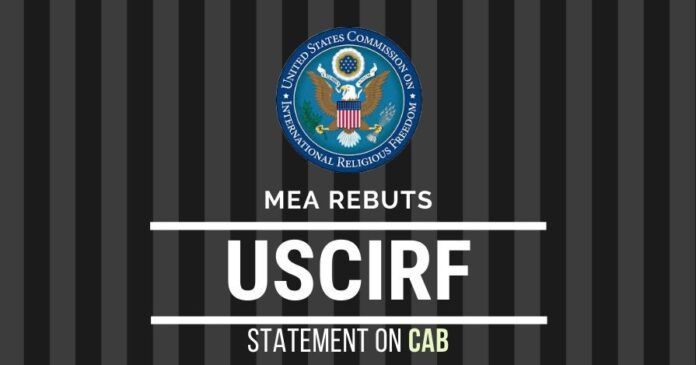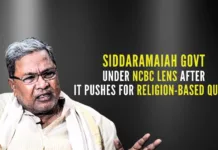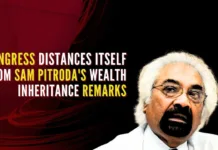
The Government of India on Tuesday slammed the US Commission on International Religious Freedom (USCIRF) for its statement on the Citizenship (Amendment) Bill, saying it was “regrettable” that the entity, which has no locus standi on the issue, has chosen to be guided by its “prejudices and biases” on it. Rejecting comments by the USCIRF, India’s External Affairs Ministry (MEA) Spokesperson Raveesh Kumar said the position articulated by the commission was not surprising given its past record.
“It is, however, regrettable that the body has chosen to be guided only by its prejudices and biases on a matter on which it clearly has little knowledge and no locus standi,” he asserted.
In a strongly-worded statement against the bill, passed by Lok Sabha on Monday, the USCIRF said “the CAB is a dangerous turn in the wrong direction” and asked the US administration to consider imposing sanctions against Home Minister Amit Shah and other principal Indian leadership if the bill with the “religious criterion” is enacted into a law. Around a decade back, the USCIRF had also favoured denying of tourist visa to Narendra Modi, the then Chief Minister of Gujarat citing “religious atrocities” during Gujarat riots in 2002. That time Congress-led UPA Government did not object on US denying VISA to one of the Chief Minister of it.
In the 2000s the Congress and the Left parties were actually trying to defame the BJP-ruled state’s Chief Minister Narendra Modi. This resulted in him being denied a visa to the West. But to their discomfiture, what we are now witnessing is many countries including the US and the UK are giving red carpet welcome to Narendra Modi, as soon as he became the Prime Minister of India from May 2014.
In its statement on Monday night, the USCIRF said, “CAB is a dangerous turn in the wrong direction; it runs counter to India’s rich history of secular pluralism and the Indian Constitution, which guarantees equality before the law regardless of faith”, adding that it was deeply troubled over the passage of the bill in Lok Sabha.
The MEA spokesperson asserted that every nation, including the US, has the right to enumerate and validate its citizenry and to exercise the prerogative through various policies. Asserting that the statement on the bill is “neither accurate nor warranted”, Kumar said the Bill provides expedited consideration for Indian citizenship to persecuted religious minorities already in India from certain contiguous countries. He said the proposed legislation seeks to address their current difficulties and meet their basic human rights and that such an initiative should not be criticized by those who are genuinely committed to religious freedom.
“The CAB does not affect the existing avenues available to all communities interested in seeking citizenship from doing so. The recent record of granting such citizenship would bear out the Government of India’s objectivity in that regard,” Kumar said.
The bill seeks to provide Indian citizenship to non-Muslims from three neighbouring Islamic countries, namely Pakistan, Bangladesh, and Afghanistan escaping religious persecution. This amendment in the bill is meant to give citizenship to around 32000 people living as refugees for decades in India, escaped from these three neighbouring Islamic countries due to religious persecution.
“Neither the CAB nor the National Register of Citizens (NRC) process seeks to strip citizenship from any Indian citizen of any faith. Suggestions to that effect are motivated and unjustified,” the MEA
spokesperson said. The NRC has been prepared in Assam to identify Indian citizens living in the state since March 24, 1971, or before.
Out of the 3.3 crore applicants, over 19 lakh people were excluded from the final NRC which was published around three-and-half months back. The NRC issue also drew sharp criticism from various quarters including human rights organizations.
- Kotak Mahindra Bank shares tank 13%. Market Cap erodes by Rs.37,721 cr post-RBI action - April 25, 2024
- Indian IT services sector staring at second straight year of muted revenue growth: Crisil - April 25, 2024
- Subramanian Swamy approaches Supreme Court on Govt’s modification of 2G Scam Judgment to avoid auction of Satellite Spectrum - April 23, 2024











[…] खबर को अंग्रेजी में यहाँ […]
Your statement “The bill seeks to provide Indian citizenship to non-Muslims from three neighboring Islamic countries, namely Pakistan, Bangladesh, and Afghanistan escaping religious persecution.” could be better worded as…
“The bill seeks to provide Indian citizenship to persecuted religious minorities from three neighboring Islamic countries, namely Pakistan, Bangladesh, and Afghanistan”